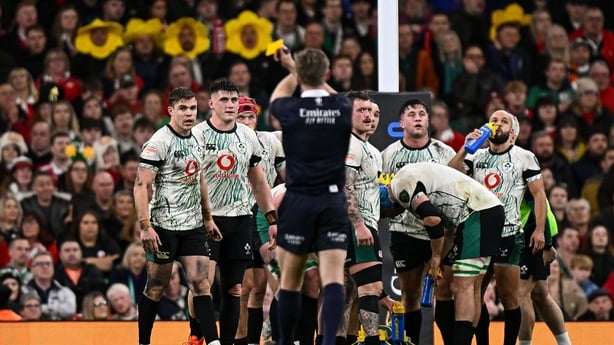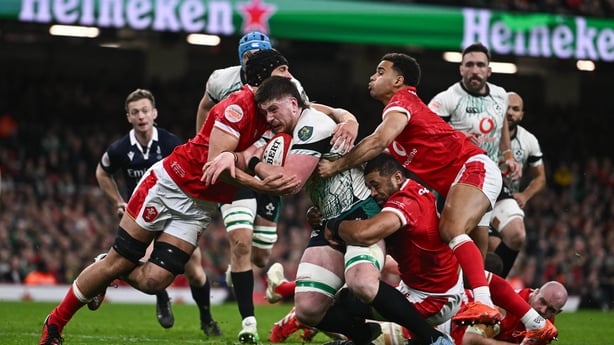Ireland passed their test in Cardiff with a win against Wales in Round 3 of the Six Nations Championship.
It was more chaotic than comfortable. A new-look Wales changed the whole landscape of their future with a very progressive attacking shape under Matt Sherratt.
It's an attacking shape that caught out Garry Ringrose as he misjudged his attempted dominant tackle on Ben Thomas. I’m surprised it’s not something that’s been highlighted, but Thomas used excellent footwork to disguise the direction in which he wished to travel. Garry Ringrose bought the dummy step and fired himself like a missile at Thomas, colliding with the Welsh inside centre’s head in the meantime.
It was a careless attempt from Ringrose, and deserved to be sanctioned. He was initially sent to the sin bin for a review, checking whether the card should be upgraded to red or be kept as a yellow.
In many cases I would err on the side of the harsher punishment, even if it’s a team I’m supporting. If we are to make the game safer, then sometimes a player will suffer the consequences of their unintended actions.
However, in this instance, while I don’t disagree with the red card, I find it unfair that Ringrose wasn’t given the benefit of the doubt because of Thomas’ change of direction before the tackle. Thomas stepped inside, at which time I think Ringrose committed, and when Thomas stepped back towards him, Ringrose had given himself no time to change his actions.
For clarity, it’s only Ringrose that made the decision to launch in for a big hit. That was his error. Thomas did nothing to deserve it and Ringrose should have more control over his footwork at the tackle line. But, a change of direction has always been one of the actions of mitigation that referees look for when bringing a dangerous tackle from a red to a yellow card.

Maybe the referee thought that the act of tackling was always illegal because of the speed of entry. The law is written in a way that if the attempted tackle is always illegal then you can’t use any mitigation, even if some mitigation exists. For example, if there was no arm wrap in the tackle then you can’t use the mitigation of a change of height or late change of direction.
I’m not sure that the tackle was always illegal in this case, and it wasn’t communicated as that either.
While I’m not really arguing the red card itself, I was still left a bit unsure of what the full set of circumstances were, due to the timing of the bunker review.
It might seem contradictory, but the next thing that I disagree with is that the red card only lasted for 20 minutes. If a red card was the outcome that the refereeing team reached, then I firmly believe the red card should stand and the 20-minute law isn’t fit for purpose.
Ringrose is an honest and clean player that got his tackle trajectory wrong. I don’t think anyone believes he intended to do something to endanger his opponent. The fact of the matter is that intent isn’t judged and the referee and his team sanctioned this action with a red card. Ireland, or any other team, shouldn’t get a chance to replace that player.
Bundee Aki showed two things last weekend. That he is still a key figure in Ireland’s fight at the tackle line. He’s a warrior on both sides of the ball and his brute force in confrontational moments is highly effective. In my mind, he also showed that the 20-minute red card is farcical. It doesn’t do enough to deter the same action again. Aki’s involvement in the game went a long way to covering over the red card.

Ireland struggled to break Wales down. They committed an act of foul play and should have had to live with those consequences. It’s been a part of sports for as long as they’ve existed. If you play outside of the rules and laws, you get sanctioned in accordance with the rulebook.
Wales were undoubtedly going to win the game without either of Ringrose or Aki on the pitch. Ireland had soaked up an enormous amount of pressure. The introduction of Aki felt like they were almost a man up at that stage.
In a different year, Wales would have gone on to win that game against 14 players. Matt Sherratt and his team would have pulled off a miracle, one that was started before Ringrose ever saw the card. They were in the game and frustrating Ireland.
Ireland managed to turn the momentum of the game and will be thrilled to win another Triple Crown, despite some of their difficulties.
However, the spotlight should be on Sherratt, his selections, the Welsh approach to the game and the players that put their best on show for Wales.

It goes to show what positive energy can do for a team, and unsurprisingly, picking an experienced test level out-half can make all the difference. Wales had been crying out for some direction. Gareth Anscombe had a very assured game and will surely keep his jersey for the next few outings.
Ireland’s midfield will pick itself in what looks like a title decider at the Aviva Stadium in two weeks. Ringrose will now face a disciplinary hearing to determine his availability for the rest of the tournament.
For now, Ireland’s dream of a third successive championship title is still a reality.
Watch a URC double-header, Leinster v Cardiff and Ulster v Scarlets, on Saturday from 2.30pm on RTÉ2 and RTÉ Player


